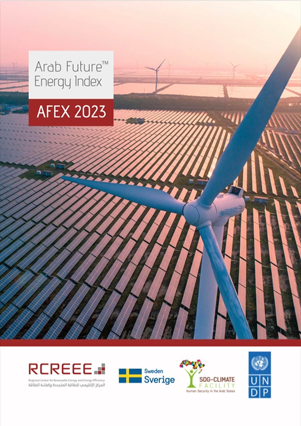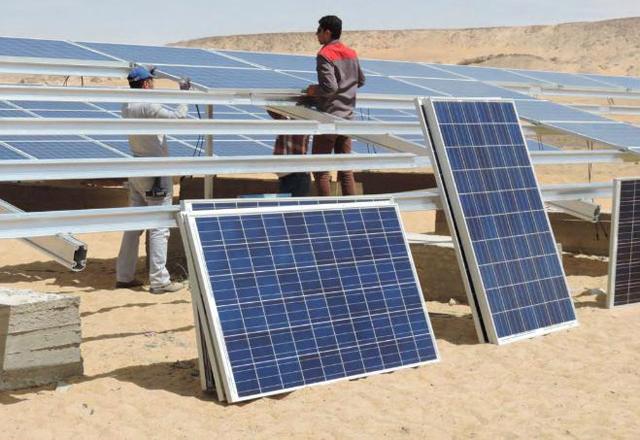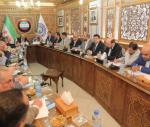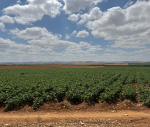You are here
Jordan ranks 2nd on Arab Future Energy Index
By Mays Ibrahim Mustafa - Sep 28,2023 - Last updated at Sep 28,2023

AMMAN — Jordan ranked second on the 2023 Arab Future Energy Index (AFEX) Renewable Energy, scoring 83 per cent in a tie with Morocco.
Egypt topped the Arab region with an 87 per cent score, while Tunisia came in third, followed by the UAE, which recorded the highest score (80 per cent) among Gulf countries.
The index is produced by the Regional Center for Renewable Energy and Energy Efficiency (RCREEE). It aims to monitor and analyse sustainable energy competitiveness in the Arab region.
The index assesses five areas that impact the implementation and deployment of renewable energy (RE) in the region. It showed that Jordan scored 56 per cent in market structure, 90 per cent in policy framework, and 73 per cent in institutional capacity.
Policy framework
The report observed that most Arab countries announced “ambitious” renewable energy targets.
It noted that Jordan raised its target for the share of renewables from 21 per cent in 2020 to 31 per cent in total power generation capacity, and 14 per cent of the total energy mix by 2030.
“Jordan is considered a front runner in renewable energy. The share of electricity from renewables in Jordan grew from 0.7 per cent in 2014 to over 13 per cent in 2019,” it added.
Only two Arab countries currently have 100 per cent renewable energy targets, and these are Djibouti (by 2035), and Morocco (by 2050), according to the report.
Market structure
The report said that Algeria, Egypt, Jordan, Lebanon, Morocco, Palestine, Tunisia and Gulf countries demonstrate a track record in Independent Power Producers (IPPs) projects.
It also noted that countries which have the legal basis for RE direct export, include Algeria, Jordan, Morocco and Tunisia.
Jordan’s General Electricity Law specifies that import and export, which is subject to the Council of Ministers approval, will be handled on a case-by-case basis, it stated.
“Algeria, Egypt, Jordan, Palestine have regulations that either ensure priority of renewable electricity to be injected to the grid or to purchase all produced electricity from RE plants,” the report added.
Slowdown in production, despite potential
The Jordan Times discussed the findings of the report with Ayoub Abu Dayyeh, a civil engineer and specialist in environmental sustainability.
He noted that the main reason behind the Kingdom’s success in renewable energy is government policies. The Renewable Energy & Energy Efficiency Law which was issued in 2012 is what opened the door for renewable energy production in Jordan, he added.
However, recent years have witnessed what can be described as a “recession” in renewable energy production, which should be investigated to determine its causes, said Abu Dayyeh.
As stated in the AFEX report, the Energy Strategy for the Energy Sector 2020-2030 targets a 31 per cent share for renewables in total power generation capacity. Abu Dayyeh pointed out that Jordan’s renewable energy share stood at roughly 2 per cent in 2014 and “jumped” to 26 per cent in 2021, then increased slightly to 27 per cent in 2022.
Recent statements by the Ministry of Energy and Mineral Resources revealed that the government has plans to revisit the Energy Strategy, and increase its target for the share of renewable energy contribution to electricity generation to 50 per cent by 2030.
Abu Dayyeh views that Jordan’ renewable energy targets fall short of its potential. He said: “Although a 50 per cent share is considered good, Jordan can do more, so why should we limit ourselves?”
Challenges in burgeoning renewables sector
Abu Dayyeh referenced the agreement Jordan signed in 2016 to pay Noble Energy $10 billion for around 45 billion cubic metres of gas over 15 years. He views that this deal negatively impacts Jordan’s renewables sector, as the purchased gas will be used to cover its electricity demand, reducing the incentive for renewable energy investments.
Jordan is currently dealing with a surplus in energy production, according to Abu Dayyeh. He explained that the country’s electrical capacity ranges between 5,000 to 6,000 megawatts, while its capacity load usage is around 1,500 megawatts at its minimum and its maximum is around 4,000 megawatts.
Addressing this issue requires investing in the Kingdom’s storage capacity, implementing electrical interconnection projects with neighbouring countries, or finding a local market for the energy surplus at competitive prices for the local industries, he added.
A Jordanian-Iraqi interconnection project is currently underway. The government is also working on increasing its electricity interconnection capacity with Egypt and selling electricity to Lebanon, according to Abu Dayyeh. However, he views that this step will not be sufficient to make full use of the “electricity potential” that exists in Jordan.
Related Articles
AMMAN — Jordan is making remarkable strides in the world of renewable energy, securing the top spot in the percentage of renewable energy ca
AMMAN — While Jordan has achieved “substantial” progress in attracting investments in the renewable energy sector, allowing third party supp
AMMAN — Jordan's total capacity of installed renewable energy generation projects stood at 2,526 megawatts until the end of July, said Minis
















